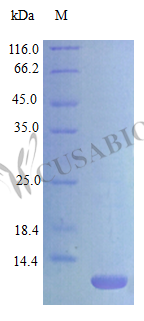The gene fragment encoding the 24-93aa of mouse CCL17 is cloned into a plasmid and then introduced into E.coli for expression. The product is the recombinant mouse CCL17 protein. Its purity is over 97% as assessed by SDS-PAGe. The endotoxin content is controlled at less than 1.0 EU/μg. The recombinant mouse CCL17 protein has been validated to be active. The bioactivity was determined in a chemotaxis bioassay using human T lymphocytes over a concentration range of 1.0-10 ng/ml.
The mouse CCL17 protein plays a pivotal role in immune responses, particularly in the recruitment and activation of T cells. CCL17 is predominantly expressed by dendritic cells (DCs) and Langerhans cells (LCs). In mouse models, CCL17 is significantly upregulated in response to inflammatory stimuli, such as TNF-α, and is involved in various pathological conditions, including asthma, atherosclerosis, and atopic dermatitis [1][2][3][4].
In the context of asthma, CCL17 is notably implicated in the recruitment of Th2 cells to inflamed lung tissues. Studies have demonstrated that CCL17 levels increase following viral infections, such as rhinovirus, which exacerbates asthma symptoms by promoting a Th2-dominant immune response [3][5].
In atherosclerosis, CCL17 has been identified as a critical factor that promotes the accumulation of T cells within atherosclerotic plaques. The presence of CCL17-expressing DCs in these lesions suggests a mechanism by which CCL17 contributes to the progression of atherosclerosis, potentially by restraining regulatory T cell (Treg) homeostasis and enhancing pro-inflammatory T cell responses [2][4].
CCL17 has been shown to influence the recruitment of Tregs within tumor microenvironments, leading to tumor immune evasion [6][7]. In models of bladder cancer, CCL17 blockade has been associated with prolonged survival, highlighting its role in modulating immune responses in cancer [6].
References:
[1] A. Oulee, F. Ma, R. Teles, B. Silva, M. Pellegrini, E. Klechevskyet al., Identification of genes encoding antimicrobial proteins in langerhans cells, Frontiers in Immunology, vol. 12, 2021. https://doi.org/10.3389/fimmu.2021.695373
[2] S. Kumar, M. Chen, Y. Li, F. Wong, C. Thiam, Z. Hossainet al., Loss of adamts4 reduces high fat diet-induced atherosclerosis and enhances plaque stability in apoe−/− mice, Scientific Reports, vol. 6, no. 1, 2016. https://doi.org/10.1038/srep31130
[3] T. Williams, D. Jackson, S. Maltby, R. Walton, Y. Ching, N. Glanvilleet al., Rhinovirus-induced ccl17 and ccl22 in asthma exacerbations and differential regulation by stat6, American Journal of Respiratory Cell and Molecular Biology, vol. 64, no. 3, p. 344-356, 2021. https://doi.org/10.1165/rcmb.2020-0011oc
[4] C. Weber, S. Meiler, Y. Döring, M. Koch, M. Drechsler, R. Megenset al., Ccl17-expressing dendritic cells drive atherosclerosis by restraining regulatory t cell homeostasis in mice, Journal of Clinical Investigation, vol. 121, no. 7, p. 2898-2910, 2011. https://doi.org/10.1172/jci44925
[5] A. Elentner, D. Finke, M. Schmuth, S. Chappaz, S. Ebner, B. Malissenet al., Langerhans cells are critical in the development of atopic dermatitis‐like inflammation and symptoms in mice, Journal of Cellular and Molecular Medicine, vol. 13, no. 8b, p. 2658-2672, 2009. https://doi.org/10.1111/j.1582-4934.2009.00797.x
[6] S. Maeda, K. Murakami, A. Inoue, T. Yonezawa, & N. Matsuki, Ccr4 blockade depletes regulatory t cells and prolongs survival in a canine model of bladder cancer, Cancer Immunology Research, vol. 7, no. 7, p. 1175-1187, 2019. https://doi.org/10.1158/2326-6066.cir-18-0751
[7] L. Marshall, S. Marubayashi, A. Jorapur, S. Jacobson, M. Zibinsky, O. Robleset al., Tumors establish resistance to immunotherapy by regulating tregrecruitment via ccr4, Journal for Immunotherapy of Cancer, vol. 8, no. 2, p. e000764, 2020. https://doi.org/10.1136/jitc-2020-000764




